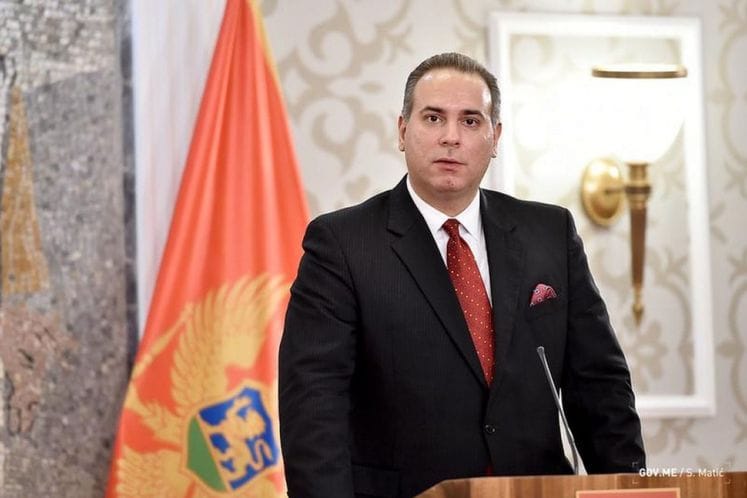- Government of Montenegro
DPM Ivanović gives interview to Dan
DPM Ivanović gives interview to Dan

Deputy Prime Minister for Foreign and European Affairs Filip Ivanović emphasized that political stability and consensus among all relevant political and social stakeholders, along with the necessary support from the European Commission, remain key factors in maintaining Montenegro’s progress on its European path.
In an interview with Dan, Ivanović pointed out that in recent years, EU enlargement has taken on a more significant political and security dimension than before. He reiterated that from the outset, the Government's position has been that Europe's security is best ensured through its unity, which is most effectively achieved through the Union's enlargement.
This perspective has been recognized in Brussels and across all EU member states. The Government of Montenegro has made EU accession its absolute foreign policy priority and, in just 13 months, has achieved remarkable progress, as evidenced by the latest assessments from the EU Council. Special commendation has been given to our dedication in the areas of the rule of law and the fight against corruption, which are fundamental pillars of European integration and key indicators of the process's credibility. In this regard, it is essential that the Government and the parliamentary majority continue to act synergistically, with a clear focus on meeting the remaining obligations of the negotiation process. Furthermore, political stability and the consensus of all relevant political and social actors, supported by the European Commission, remain crucial for preserving Montenegro’s European trajectory, Ivanović stated.
Regarding relations with neighbouring countries, Ivanović affirmed Montenegro’s commitment to building strong and stable ties with all nations in the region, including Bosnia and Herzegovina and Croatia. Due to their geographic, historical, and economic interconnectedness, regional countries are inherently reliant on one another. Strong cooperation is not only a prerequisite for European integration but also a critical factor for the welfare of all citizens of the Western Balkans. We firmly believe that all countries in the region belong in the European Union. Once Montenegro achieves its goal of becoming the next EU member state, we will be an active promoter of the enlargement policy as the best catalyst for stability and prosperity in the region, Ivanović said.
When asked whether certain political moves by the parliamentary majority could negatively affect Montenegro's perception in Brussels and hinder its European progress, Ivanović emphasised:
The perception of Montenegro in Brussels is clearly reflected in the 2024 European Commission Annual Report, which is the most favourable to date. It acknowledges Montenegro's dedication to essential reforms and European values. However, every decision and public action is closely monitored by our European partners.
Issues related to historical events, such as the Resolution on genocide in the Jasenovac, Dachau, and Mauthausen camps, require particular sensitivity and responsibility—not only from domestic political establishments but also from international stakeholders. As repeatedly stated, no one in Montenegro associates past crimes with any specific ethnic or state group, affirming our principled stance on reconciliation and strengthening regional relations.
The Government of Montenegro, constitutionally authorized to lead domestic and foreign policy, has consistently demonstrated a principled approach to its foreign policy priorities, including good neighbourly relations and regional cooperation.
Ivanović highlighted that it is crucial for all stakeholders to prioritize Montenegro's long-term interests over individual agendas to ensure a stable and positive international perception.
When asked about the sincerity of parliamentary support for the government in the context of European integration, Deputy Prime Minister Ivanović emphasized that achieving progress on this path requires genuine and united commitment from all political actors, both from the ruling majority and the opposition. He stated that this is not merely a matter of political rivalry but a strategic goal that should unite the entire society.
The support for EU integration must be reflected in concrete actions, such as adopting reform laws, strengthening institutions, and consistently implementing European standards. While Montenegro has made significant progress, evidenced by recognition from European partners, it is disheartening that political maneuvering and pressures—manifested in parliamentary blockades, delays in adopting budgets, and attempts to destabilize institutions—persist.
These actions create a false narrative about the Government's commitment to implementing reforms and achieving European progress. If the opposition genuinely supports Montenegro's EU path, it should refrain from such destructive tactics and provide active support to the Government in implementing necessary reforms and adopting important legislation. Political points should be pursued through creative and constructive methods instead.
Deputy Prime Minister Ivanović emphasized the importance of maintaining focus on the broader achievements and goals of EU accession, rather than overly magnifying individual challenges. He pointed out that these challenges should serve as motivation to continue progress and that sustaining momentum relies on the ability to objectively recognize advancements and anticipate potential difficulties.
To this end, the government plans to intensify public awareness campaigns highlighting the tangible benefits of EU membership and the reforms already improving citizens’ daily lives.
When asked if enthusiasm for EU integration has diminished in Montenegro, Ivanović rejected the notion, stating that while the complex nature of the reform process might cause occasional fluctuations in public perception, enthusiasm remains intact. He stressed that various factors, including political parties, media, and other social actors, influence public opinion. However, concrete successes—such as closing negotiation chapters after seven years, holding three intergovernmental conferences in one year, joining SEPA, adopting the Reform Agenda, and earning positive evaluations from the EU in key areas like rule of law and anti-corruption—underscore Montenegro's progress on the European path.
Regarding future expectations for EU integration, Ivanović reiterated the government’s commitment to completing negotiations by the end of 2026, in cooperation with relevant European Commission bodies. Achieving this will require maximum engagement and dedication from all government departments, as well as from Parliament and other institutions. Key outcomes will include closing negotiation chapters, successfully accessing funds from the Growth Plan, and further improving Montenegro's economic and infrastructural landscape.
